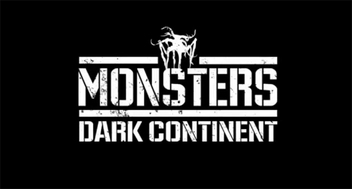
On a bright sunny afternoon, somewhat unusual for an early April day in London I head over to Freud’s in central to meet with British writer and director, Tom Green, (not to be confused with the American film star). Tom Green directed and also co-wrote Misfits straight after finishing film school. But he’d already garnered a lot of interest from television and film from his first year project in film school, the excellent short, Brixton 85. It’s a powerful and realistic dramatization of the events that led up to the 1985 Brixton riots and a project Green has said he wishes to return to and develop into a full feature length film.

The original Monsters turned the relatively unknown Edwards into a major name and a formidable and sought after filmmaker and now the sequel looks set to do the same for Tom Green. Of course, I say sequel, but Monsters: Dark Continent is really a standalone film. A sequel more in “ethos” as the director describes it. In Monsters: Dark Continent, the titular behemoths have expanded round the globe and the American Government is doing its utmost to annihilate them. The film follows a group of soldiers who have been sent to help quell the monster populace in the Middle East. But consistent clumsy bombing with heavy collateral damage has sparked insurgent groups to rebel against the American presence. So U.S. ground troops have been deployed to fight the insurgent groups. How’d ya like them apples, social commentary?!
Monsters: Dark Continent is a very different film to its predecessor. The original film was a tranquil and subtle love story. Dark Continent is a gritty and visceral war film. But it’s still the same universe. It’s the same monsters and whilst completely different in tone it still uses the same principles that Edwards used for the original Monsters –perceptive allegory on a paper-thin budget. I first ask him what attracted him To Monsters: D.C.in the first place.
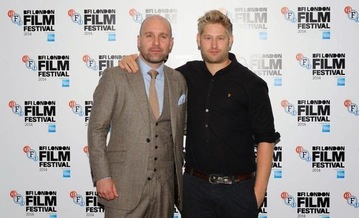
Dark Continent feels like a much bigger special effects film than the original. The aliens are seen throughout the movie, as opposed to the one scene we see them in (in full) in the original, with effects that were apparently created on Edwards’ laptop. And the special effects this time around have certainly improved. We see a variety of aliens in the film and in one early and brilliant scene there is a dogfight with an alien infant that the soldiers are betting on. But although it might not look like it, thanks to some stunning lighting and excellent filters, Dark Continent, like the original, was still made on a very small budget.
“I think the misconception is we had a lot more money than Gareth. We didn’t.” Says Tom. “We had a little bit more. You know, I think Gareth said he had a fiver. I think we had about eight quid. So it really was low budget filmmaking and there was an amount of money there to go and make it and there was a sort of a zeitgeist moment with it I suppose to just go do it and there was an energy and a timeframe to make this film.”
Monsters: D.C. may not feel quite like the spiritual road trip film that the original Monsters did, but it’s clear that the making of the film itself was quite the pilgrimage. Working in collaboration with screenwriter Jay Basu, Tom Green and the cast undertook a geographical odyssey making the film.
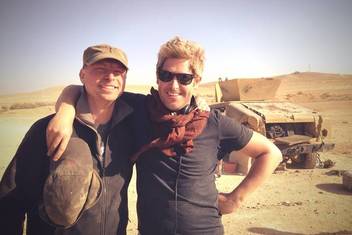
Jay and I worked very closely on [the script] and it was done really quickly. And it was an exciting process because I went off on a recce to Jordan, I went to Detroit and I was coming back with ideas and putting a lot of visuals into the script and I think we really wanted to remain truthful to the principles of the first Monsters. Myself and the producers talked very much [about the idea] that it shouldn’t be a sequel in terms of a continuing narrative, it should be one in terms of that ethos of filmmaking, so, you know, the creatures perhaps being an allegory or having the metaphorical quality Gareth’s had for, obviously, the issues he was discussing with immigration and things in Mexico and the US.
So we wanted it to have that ethos of - how you make a hugely ambitious film - on a very low budget and have a slightly more socially relevant background to a sci-fi movie. But equally it should stand completely alone.”
Indeed the film does stand alone, being very different in tone and a much more aggressive film than the original, focused on warfare and the psychological torment that comes with it. One of the principle characters, top American sniper, Sergeant Frater, undergoes his own Heart of darkness-esque odyssey in the film. He feels very real, thanks to Johnny Harris’ brilliant performance and the clever and intuitive writing of the character. The first scenes of the film show Frater in disguise as an Arab, sniping out an insurgent target, followed by the strict and tense search of him as he re-enters the base still in disguise. The character reminded me of American Sniper’s Chris Kyle, and I asked Tom if he’d been an influence.
“Frater isn’t based on any one person but we did a lot of first hand research. I was meeting with an undercover British sergeant who was in between tours in Afghanistan and we met before he went off to one tour and had come back from another. And that’s where the opening sequence came from because he described things to me and smaller details to me that you perhaps might not know. Like when you’re re-entering the base as an undercover operative - that’s almost the most tense time because the people at the base don’t know you’re undercover - because that’s the whole principle of it.”
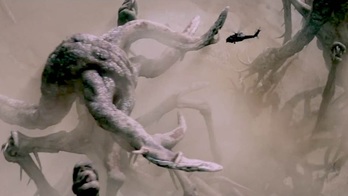
“What I noticed in conversations with him,” Tom continues about the sergeant he interviewed, “was the psychological impact of what he was doing. And he was a very normal family man who had a family back here - and I felt there was. . . I could see the psychological effect on him personally when I was speaking to him. Also, you know [we did] a lot of research and documentary research and looking into characters. There’s a lot of stories out there of characters who have suffered from psychological and post-traumatic stress disorder and I think that what we were trying to say with Frater is that he was experiencing a sort of a post-traumatic stress disorder in-situ whilst in conflict, whilst on a tour and it was a build up the tours he had done.
And I recruited,” He laughs at the wording he’s started using, “I’m still in the military zone,” he confesses with some humour, “I cast, a young man from Detroit who plays one of the team, one of the patrol, who’d done two tours in Iraq and we’d worked very closely with US marines out there. And I think we tried to base most of the dramatic scenes, other than the creature scenes obviously, on first-hand accounts of soldiers I’d interviewed and spoken with. We tried to base the film very much on authenticity is what I’m getting at really.”
Monsters: Dark Continent may be the first science fiction film to show realistic depictions of Post-traumatic stress disorder and present a discourse over the psychological state of men at war in modern warfare.
“Frater isn’t based on any one person and neither is anyone in the film. It’s trying very much to be an authentic representation of the sorts of young men that go to war and the sorts of men who have been at war for too long perhaps.”
With our time running out, as indicated by the lady gesturing for us to round up outside the door, I get Tom to talk a little bit about Misfits. “Earlier you mentioned Misfits. How was that experience and how has it been going from working in television with E4 and going into what is a very big feature film?”
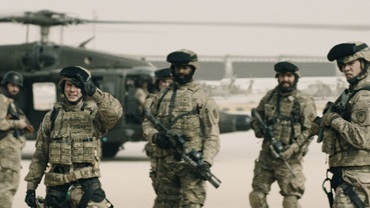
With our time almost running out and the lady waving to us outside the door, I asked Tom about the film that started it all. “Are you still planning on returning back to Brixton 85 and taking that any further as a feature film?”
“That’s always been a passion project for me. You know I was really, uh, that was something I did in my first year at film school and I really loved making that project. As I say I’m really passionate about it.”
“It works really well.”
“It’s something I’ve always had in development and of course things come up and then you go and do something else.”
“Of course.”
“But yes you know, one day.” He says enthusiastically. “Watch this space, hopefully I can make that film. I think it’s a story that needs to be told and it still has a great social relevance I think.”
“I agree. I think we have to call it quits there” I say, as the lady outside arranging the interviews has been gesturing for us to finish up for about two minutes now. But, I sneak in one final, all important question, “finally, are you with Geek?”
“Am I with Geek?” Tom responds smiling. “I’m always with Geek!”
Monsters: Dark Continent is out May 1st. Check our review out now!

 RSS Feed
RSS Feed
